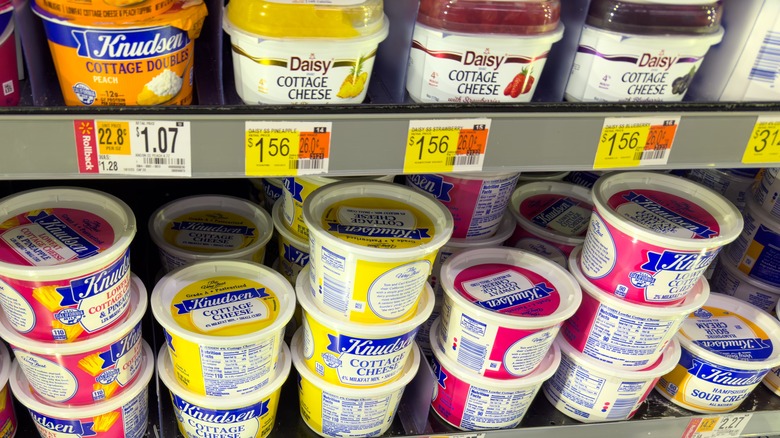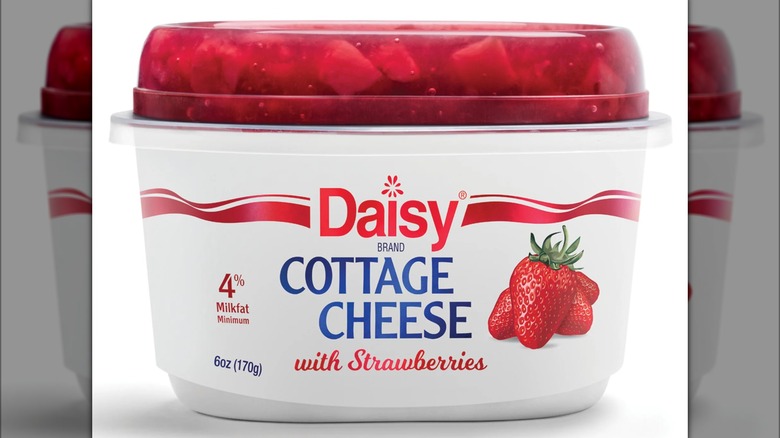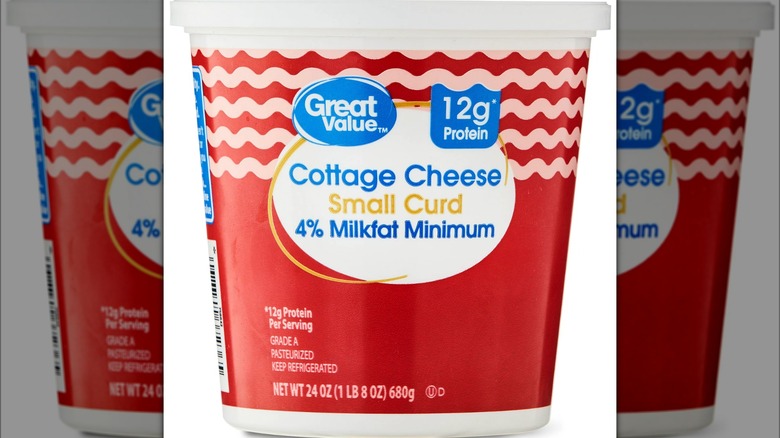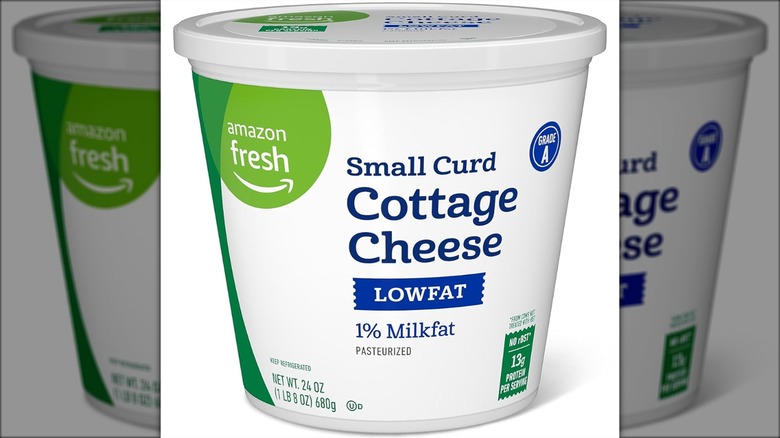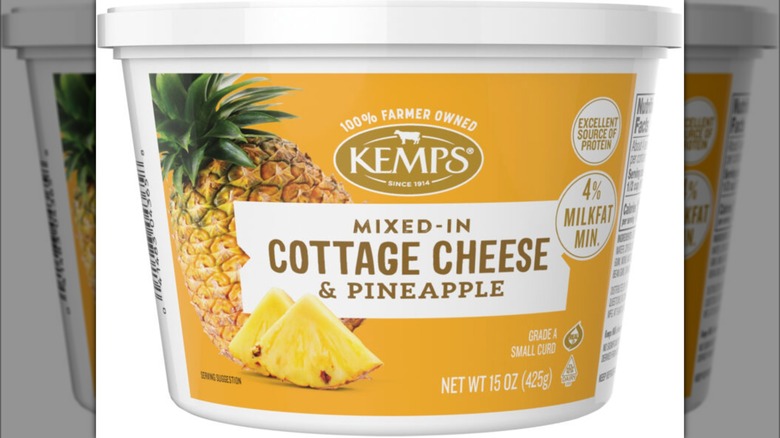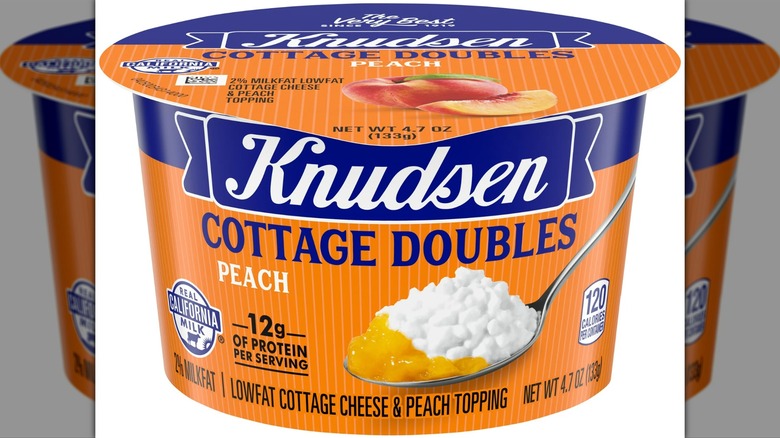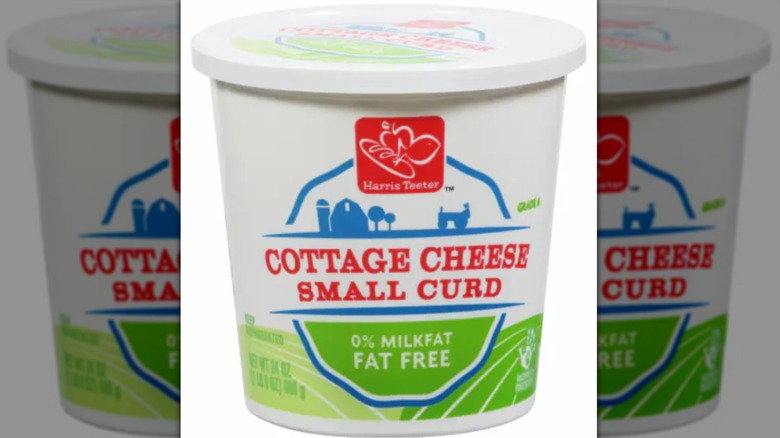14 Of The Unhealthiest Store-Bought Cottage Cheese
Cottage cheese is having a moment. Made from small curds bound together in a creamy sauce, the cheese has never really been out of style, but it feels like more people than ever are getting to know that its rich yet neutral flavor and high-protein nature make cottage cheese usable in a variety of ways. Despite it being well-known as a healthy snack, though, that's not always the case. The nutritional quality is entirely dependent on the brand you buy, and some products can be surprisingly unhealthy.
One of the main issues with cottage cheese is sodium. Although this cheese is rarely salt-free, thanks to the sodium in the milk used to make it and additional salt added during the production process to enhance its flavor, its content can vary wildly. Some low-sodium brands have as little as 55 milligrams per serving, while others can cover almost a quarter of the 2,300-milligram suggested daily limit for adults in one go. Other brands can have a surprising amount of added sugar in them, which is again added to improve its flavor but can nudge up against your daily limits. In this article, we assessed the nutritional quality of cottage cheese brands primarily by their sodium levels, while also looking at added sugar and unnecessary added ingredients.
1. Daisy Cottage Cheese with Strawberries
Daisy is a familiar brand to cottage cheese lovers, with its product line offering a variety of flavors to cater to every taste. For those with a sweeter tooth, its Cottage Cheese with Strawberries seems like a great choice, combining high-protein cheese with a sweet, flavorful fruit compote. All of this flavor comes at a nutritional cost, though, with this product delivering a high amount of sodium and added sugar. In every serving of Daisy Cottage Cheese with Strawberries, there's 420 milligrams of sodium (18% of your daily value) and 5 grams of added sugar.
Neither of these ingredients are particularly attractive, and the whole picture is made even unhealthier by this product's saturated fat levels. With 3.5 grams of saturated fat, Dairy Cottage Cheese with Strawberries covers 18% of your daily value. This combo of sodium and high fat could potentially pose issues for folks who have high cholesterol. We're also not wild about some of the other ingredients in this product. Although the added cornstarch in this cottage cheese doesn't pose any health risks, we'd prefer to go for cottage cheese brands that are made from as few ingredients as possible.
2. Lactaid 4% Milkfat Cottage Cheese
For folks who are lactose intolerant, cheese can be one of the hardest dietary sacrifices to make. So we can understand why people might think that Lactaid's cottage cheese is a godsend. Its 4% Milkfat Cottage Cheese is 100% lactose-free, and promises an easy digestive experience with all of the flavor of a regular product.
However, a lot of its taste is bolstered by its 440 milligrams of sodium per serving. This sodium amount makes Lactaid 4% Milkfat Cottage Cheese one of the saltiest on the market — and with its 3 grams of saturated fat, it's also fairly fatty. Its sodium content is good evidence of why you should never assume that a snack is healthy, even if it's often deemed to be. Instead, you should always seek out sodium-free or low-sodium cottage cheese brands, ideally those that also have lower levels of saturated fat.
3. Great Value 4% Milkfat Small Curd Cottage Cheese
Cottage cheese is one of those things that people always want in their fridge, but they don't want to have to spend a pretty penny on it. That's where Walmart's Great Value cottage cheese comes in. Its 4% Milkfat Small Curd Cottage Cheese is a reasonably-priced, accessible option, with its large tubs ensuring that it goes a long way.
The price tag might be appealing, however, it's not the healthiest option. With 400 milligrams of sodium per serving, it covers a significant proportion of your daily value — making it one of the more surprising unhealthy Great Value foods out there. It also has 3 grams of saturated fat in its half-cup serving size. The sodium amount is particularly important to note, due to its potential effects on blood pressure. Excessive sodium intake can increase the amount of fluids in our blood, which can then in turn increase blood pressure and raise the risk of hypertension-associated diseases. With this cottage cheese, its neutral flavor lends itself to being combined with other ingredients — but if you're not careful, that can increase your sodium intake even further.
4. Breakstone's Strawberry Cottage Doubles
Breakstone has made a name with its dairy products, and it's clearly well aware of its cottage cheese's snackable nature. Strawberry Cottage Doubles are proof of this, with the company offering snack packs combining cottage cheese and a sugary strawberry topping. However, it's probably no surprise that sugary topping has a fair amount of sweetener in it -– in just a few spoonfuls, you get 6 grams of added sugar. This cottage cheese isn't exactly salt-free, either, and delivers 350 milligrams per serving.
While the nutritional label on this product states that it provides 12% of your daily value for added sugar, some prominent health organizations have suggested that the actual limit on how much you should be consuming is far less. The American Heart Association states that women should have no more than 25 grams of added sugar per day, while men should limit their intake to 36 grams daily. Consuming high amounts of added sugar can have a significant effect on your health, impacting everything from your skin quality, to your liver, to your mood, and even your sexual health. Probably not worth it for a few bites of cottage cheese, huh?
5. Dairy Pure Cottage Cheese Blueberry Mix-Ins
Cottage cheese mix-ins are all the rage at the moment, with more and more companies realizing that the combination of sweet fruity flavors and rich, creamy cottage cheese makes an exciting replacement for fruit yogurt. Depending on the brand you choose, though (and there are a lot of cottage cheese brands out there), you may be getting more than you bargained for. Dairy Pure's Cottage Cheese Blueberry Mix-Ins has a particularly poor nutritional profile, containing a whopping 480 milligrams of sodium and 11 grams of total sugar per serving.
If you're not keeping an eye on the nutritional labels of your food, it can be tricky to know how much sodium you're eating. However, there are a few key signs. Bloating and puffiness can occur as a result of excessive sodium intake, due to your body retaining too much fluid, per WebMD. This can also cause a sudden increase in weight. You may also notice that you're using the restroom more than usual, not sleeping normally, or that your stomach is feeling unsettled. If you're noticing any of these symptoms, it may be worth talking to a health professional or dietitian to see if it is related to salt intake and whether you can adjust your diet accordingly.
6. Westby Lowfat Cottage Cheese
One of the biggest concerns around eating cottage cheese (or any cheese) is fat intake. Luckily, cottage cheese is just as good when it's low fat, and Westby Lowfat Cottage Cheese is one of the more popular options out there. Unfortunately, the brand has clearly decided that the best way to replace the flavor lost from having a lower fat quantity is by adding salt, and this results in it having a high 450 milligrams of sodium per serving.
Salt content in cheese is a perennial problem, whether it's low fat or not. The additive acts both as a flavor enhancer and a preservative, extending its shelf life by preventing bacteria from growing too quickly. It also contributes to cheese's texture, helping the casein bind together more easily. This texture is further improved in Westby Lowfat Cottage Cheese by carrageenan, a common additive that's faced a lot of controversy for its potential health effects – and which here appears to add the smoothness that's lost due to the lower fat content. Although low fat choices can be attractive, it's always worth remembering that they can contain other ingredients that may knock them into more unhealthy territory.
7. Amazon Fresh Low Fat Small Curd Cottage Cheese
Amazon Fresh has quickly become a major player in the food industry, allowing you to have the basics delivered to your doorstep in no time. Amongst these basics is its Low Fat Small Curd Cottage Cheese — but its ingredients list is far from simple. Each serving has a generous 460 milligrams of sodium, covering 20% of your daily value in just a half-cup.
As well as this, this cottage cheese has one ingredient in it we'd rather not see: carrageenan. Carrageenan is extracted from red seaweed, and is frequently added to foods to thicken and emulsify them, making it the perfect choice to bring cottage cheese mixtures together. Unfortunately, carrageenan has been observed to produce inflammatory effects in humans, and in animal studies it's produced some worrying results. A study published in Cancer Research examined the effects of carrageenan intake on rats, and found that it led to a higher rate of colon tumors.
8. Cabot Creamery Cottage Cheese
There's something about Cabot Creamery's products that just feels comforting. We don't know whether it's its homely logo, simple color scheme, or claim that its food is "fresh from Vermont," but at first glance it looks like an all-natural winner that you can use to snack on or add fluff to scrambled eggs. A closer inspection at the ingredients list for its cottage cheese, however, tells a different story. Each serving has 420 milligrams of sodium, enough to cover 18% of your daily value. Curiously, too, this cottage cheese contains carrageenan. It's curious because carrageenan is usually reserved for low fat cottage cheese products, where it adds thickness and improves texture — but Cabot Creamery's cottage cheese still has a generous 2.5 grams of saturated fat.
One of the most worrying potential impacts of carrageenan is its effect on the digestive system, and particularly on the colon. A review published in Carbohydrate Polymers discussed carrageenan's ability to cause colon inflammation, also known as colitis. This can result in a change in stools, abdominal pain, weight loss, and fatigue, according to the Cleveland Clinic. If you notice any of these symptoms, it's important to get in touch with a doctor or healthcare professional at the first opportunity.
9. Great Value Lowfat Cottage Cheese
Walmart's Great Value range doesn't just offer one version of each item. For many of its products, including its cottage cheese, the store offers a selection to cater to various tastes. Great Value Lowfat Cottage Cheese might seem like a healthier choice than its 4% Milkfat offering, and it's definitely true that its nutritional information looks better on first glance. While this cheese does still have a notable sodium content, its 360 milligrams per serving is lower than the 400 milligrams of the other version. Its saturated fat level is also half that of the 4% Milkfat version, at 1.5 grams.
However, looking at its ingredients list a little more closely might put you off. This cottage cheese is a mass of various gums, added sugar, and carrageenan, as well as maltodextrin. Maltodextrin is a sweetener that shows up in various food products, and is often used to thicken foods and improve their texture. However, like regular sugar it has a high glycemic index value, and therefore can spike your blood sugar considerably when consumed in sufficient quantities. Although its maltodextrin content does appear to be low, and this additive is generally safe, it's still worth noting.
10. Kemps Cottage Cheese with Pineapple
Pineapple is often paired with cottage cheese, with its tart, sweet taste perfectly offsetting the creamier dairy notes. Dairy giant Kemps is never one to be outdone by competitors, and true to fashion it offers its own Cottage Cheese with Pineapple product. We've gotta say, though, we're not a fan of what's in it. This cottage cheese is both salty and sweet, containing 400 milligrams of sodium and 3 grams of added sugar per serving, both covering significant proportions of your daily value.
Kemps Cottage Cheese with Pineapple also has a slew of additional ingredients like cornstarch, guar and carbon bean gum, and carrageenan — which, to be honest, we'd rather not see in a pretty simple food product. Although its sugar content is pretty small compared to some other cottage cheeses out there, it's still important to take note of. It's also important to think about how you can cut down on sugar in your diet more generally, by opting for snack options that don't have added sugar and consuming fewer sugary drinks. Getting used to reading nutritional labels can be a crucial first step in controlling added sugar intake.
11. Anderson Erickson Low Fat Cottage Cheese
Cottage cheese is meant to be simple, y'all. So why do all these manufacturers keep putting so much salt in them? Anderson Erickson is a particular culprit of this, with its Low Fat Cottage Cheese containing 460 milligrams of sodium. This makes it one of the saltier options available today, and covers 20% of your daily value. To put into perspective how salty that is, a serving of FAGE 2% Milkfat Plain Greek Yogurt contains just 55 milligrams of sodium. While the two products aren't exactly the same, they both offer a smooth creaminess and mountains of protein — it's just that you'll get way more salt with one than the other.
Unfortunately, excessive salt consumption is a widespread issue. Almost every population across the world eats too much salt, and much of this sodium comes from processed foods like cottage cheese. Crucially, we do need some sodium in our diets: The nutrient helps keep our nerves and cells functioning properly. However, the likelihood of not getting enough sodium is very low, and so instead, focus on consuming less whenever possible.
12. Knudsen Cottage Cheese Doubles, Peach Flavor
It's fair to say that cottage cheese and peach is a pretty delicious combo. Knudsen knows this fact well, and its Peach Flavor Cottage Cheese Doubles is a serious crowd pleaser. However, you get a fair amount of sugar in a small serving size if you opt for this after-dinner treat, with 6 grams of added sugar in every portion. At 340 milligrams of sodium, this isn't the saltiest option out there, but its sodium content is still notable and contributes pretty significantly to your overall recommended daily value of 2,300 milligrams.
Both sodium and sugar intake can affect hypertension, but while most people are pretty aware of sodium's effect, fewer folks are aware of how sugar impacts it. Sugar can reduce the amount of nitric oxide in your blood, which can then narrow your blood vessels and lead to higher blood pressure. Consuming added sugar can also make you more sensitive to the impact of sodium on your blood pressure, with the two going hand in hand to promote hypertension. While this cottage cheese product has relatively small amounts of both nutrients, over time things can add up.
13. Harris Teeter Fat Free Small Curd Cottage Cheese
Fat free cottage cheese can seem like a smart choice, especially if you're using it as a mayo substitute in foods like egg salad – and you'd be forgiven for assuming it was. With no fat, a small amount of carbs, and high levels of protein in products like Harris Teeter's Fat Free Small Curd Cottage Cheese, the food can feel like it gives you a lot of nutritional bang for your buck. All that flavor has to come from somewhere, though — and in Harris Teeter's case, its cottage cheese is stuffed with sodium, containing 430 milligrams per serving.
Its texture is also improved by carrageenan, which bulks up fat free cottage cheese formulations but which also carries its own concerns. What we're most confused about, though, is the 2 grams of added sugar in this cheese. This isn't marketed as a sweet product, after all, and so the presence of added sugar (however small) feels unnecessary. Unexpected added sugar in savory foods is unfortunately common, and it's added to bolster and round out flavors. When it's added to foods you might not expect, though, you can easily start consuming more of it than you mean to.
14. Friendship Dairies Cottage Cheese with Pineapple
Ah, cottage cheese with pineapple. A combination that can be relied on to deliver flavor, and to supply you with a lot of sugar in one go. Friendship Dairies Cottage Cheese with Pineapple is no exception. This cottage cheese may be pleasingly low in sodium, containing just 300 milligrams, but it also has a high 15 grams of total sugars per serving. Although some of these sugars will naturally come from the pineapple that's included in the recipe, much of it will likely come from the sugar listed on the ingredients list (which also lists maltodextrin, carrageenan, several types of gums, and artificial flavors and colors).
Although added sugar is the type we need to keep an eye on most closely, it's important to consider the amount of total sugar we eat as well. The more sugar we eat, the harder our pancreas has to work, which can eventually create a strain and affect its ability to produce insulin. This can increase the likelihood of developing insulin resistance or type 2 diabetes.
